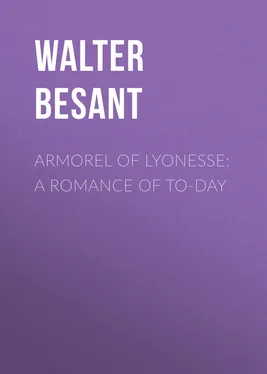Walter Besant - Armorel of Lyonesse - A Romance of To-day
Здесь есть возможность читать онлайн «Walter Besant - Armorel of Lyonesse - A Romance of To-day» — ознакомительный отрывок электронной книги совершенно бесплатно, а после прочтения отрывка купить полную версию. В некоторых случаях можно слушать аудио, скачать через торрент в формате fb2 и присутствует краткое содержание. Жанр: foreign_antique, foreign_prose, на английском языке. Описание произведения, (предисловие) а так же отзывы посетителей доступны на портале библиотеки ЛибКат.
- Название:Armorel of Lyonesse: A Romance of To-day
- Автор:
- Жанр:
- Год:неизвестен
- ISBN:нет данных
- Рейтинг книги:5 / 5. Голосов: 1
-
Избранное:Добавить в избранное
- Отзывы:
-
Ваша оценка:
- 100
- 1
- 2
- 3
- 4
- 5
Armorel of Lyonesse: A Romance of To-day: краткое содержание, описание и аннотация
Предлагаем к чтению аннотацию, описание, краткое содержание или предисловие (зависит от того, что написал сам автор книги «Armorel of Lyonesse: A Romance of To-day»). Если вы не нашли необходимую информацию о книге — напишите в комментариях, мы постараемся отыскать её.
Armorel of Lyonesse: A Romance of To-day — читать онлайн ознакомительный отрывок
Ниже представлен текст книги, разбитый по страницам. Система сохранения места последней прочитанной страницы, позволяет с удобством читать онлайн бесплатно книгу «Armorel of Lyonesse: A Romance of To-day», без необходимости каждый раз заново искать на чём Вы остановились. Поставьте закладку, и сможете в любой момент перейти на страницу, на которой закончили чтение.
Интервал:
Закладка:
'Soft black – not hard black. The dark velvet eyes which hold the light. Dick, I should like to paint those eyes. She is now looking at our boat. I can see her lifting her hand to shade her eyes. I should like to paint those eyes just at the moment when she gives away her heart.'
'You cannot, Childe Roland, because there could only be one other person present on that interesting occasion. And that person must not be you.'
'Dick, too often you are little better than an ass.'
'If you painted those eyes when she was giving away her heart it might lead to another and a later picture when she was giving away her temper. Eyes which hold the light also hold the fire. You might be killed with lightning, or, at least, blinded with excess of light. Take care!'
'Better be blinded with excess of light than pass by insensible. Some men are worse than the fellow with the muck-rake. He was only insensible to a golden crown; they are insensible to Venus. Without loveliness, where is love? Without love, what is life?'
'Yet,' said Dick, drily, 'most of us have got to shape our lives for ourselves before we can afford to think of Venus.'
It will be understood that these two young men represented two large classes of humanity. One would not go so far as to say that mankind may be divided into those two classes only: but, undoubtedly, they are always with us. First, the young man who walketh humbly, doing his appointed task with honesty, and taking with gratitude any good thing that is bestowed upon him by Fate. Next, the young man who believes that the whole round world and all that therein is are created for his own special pleasure and enjoyment; that for him the lovely girls attire themselves, and for his pleasure go forth to dance and ball; for him the actress plays her best; for him the feasts are spread, the corks are popped, the fruits are ripened, the suns shine. To the former class belonged Dick Stephenson: to the latter, Roland Lee. Indeed, the artistic temperament not uncommonly enlists a young man in the latter class.
'Look!' cried the artist. 'She sees us. She is coming down the hill. Even you can see her now. Oh! the light, elastic step! Nothing in the world more beautiful than the light, elastic step of a girl. Somehow, I don't remember it in pictures. Perhaps – some day – I may – ' He began to talk in unconnected jerks. 'As for the Greek maiden by the sea-shore playing at ball and showing bony shoulders, and all that – I don't like it. Only very young girls should play at ball and jump about – not women grown and formed. They may walk or spring as much as they like, but they must not jump, and they must not run. They must not laugh loud. Violent emotions are masculine. Figure and dress alike make violence ungraceful: that is why I don't like to see women jump about. If they knew how it uglifies most of them! Armorel is only a child – yes – but how graceful, how complete she is in her movements!'
She was now visible, even to a short-sighted man, tripping lightly through the fern on the slope of the hill. As she ran, she tossed her arms to balance herself from boulder to boulder. She was singing, too, but those in the boat could not hear her; and before the keel touched the sand she was silent.
She stood waiting for them on the beach, her old dog Jack beside her, a smile of welcome in her eyes, and the sunlight on her cheeks. Hebe herself – who remained always fifteen from prehistoric times until the melancholy catastrophe of the fourth century, when, with the other Olympians, she was snuffed out – was not sweeter, more dainty, or stronger, or more vigorous of aspect.
'I thought you would come across this morning,' she said. 'I went to the top of the hill and looked out, and presently I saw your boat. You have not ventured out alone again, I see. Good-morning, Roland Lee! Good-morning, Dick Stephenson!'
She called them thus by their Christian names, not with familiarity, but quite naturally, and because when she went into the world – that is to say, to Bryher Church – on Sunday afternoon, each called unto each by his Christian name. And to each she gave her hand with a smile of welcome. But it seemed to Dick, who was observant rather than jealous, that his companion appropriated to himself and absorbed both smiles.
'Shall I show you Samson? Have you seen the islands yet?'
No; they had only arrived two days before, and were going back the next day.
'Many do that,' said the girl. 'They stay here a day or two: they go across to Tresco and see the gardens: then perhaps they walk over Sallakey Down, and they see Peninnis and Porthellick and the old church, and they think they have seen the islands. You will know nothing whatever about Scilly if you go to-morrow.'
'Why should we go to-morrow?' asked the artist. 'Tell me, that, Dick.'
'I, because my time is up, and Somerset House once more expects me. You, my friend,' Dick replied, with meaning, 'because you have got your work to do and you must not fool around any longer.'
Roland Lee laughed. 'We came first of all,' he said, turning to Armorel, 'in order to thank you for – '
'Oh! you thanked me last night. Besides it was Peter – '
'No, no. I refuse to believe in Peter.'
'Well, do not let us say any more about it. Come with me.'
The landing-place of Samson is a flat beach, covered with a fine white sand and strewn with little shells – yellow and grey, green and blue. Behind the beach is a low bank on which grow the sea-holly, the sea-lavender, the horned poppy, and the spurge, and behind the bank stretches a small plain, low and sandy, raised above the high tide by no more than a foot or two. Armorel led the way across this plain to the foot of the northern hill. It is a rough and rugged hill, wild and uncultivated. The slope facing the south is covered with gorse and fern, the latter brown and yellow in September. Among the fern at this season stood the tall dead stalks of foxglove. Here and there were patches of short turf set about with the withered flowers of the sea-pink, and the long branches of the bramble lay trailing over the ground. The hand of some prehistoric giant has sprinkled the slopes of this hill with boulders of granite: they are piled above each other so as to make carns, headlands, and capes with strange resemblances and odd surprises. Upon the top they found a small plateau sloping gently to the north.
'See!' said Armorel. 'This is the finest thing we have to show on Samson, or on any of the islands. This is the burial-place of the kings. Here are their tombs.'
'What kings?' asked Dick, looking about him. 'Where are the tombs?'
'The kings,' Roland repeated; 'there can be no other kings. These are their tombs. Do not interrupt.'
'The ancient kings,' Armorel replied, with historic precision. 'These mounds are their tombs. See – one – two – half a dozen of them are here. Only kings had barrows raised over them. Did you expect graves and headstones, Dick Stephenson?'
'Oh, these are barrows, are they?' he replied, in some confusion. A man of the world does not expect to be caught in ignorance by the solitary inhabitant of a desert island.
'A long time ago,' Armorel went on, 'these islands formed part of the mainland. Bryher and Tresco, St. Helen's, Tean, St. Martin's and St. Mary's, were all joined together, and the road was only a creek of the sea. Then the sea washed away all the land between Scilly and the Land's End. They used to call the place Lyonesse. The kings of Lyonesse were buried on Samson. Their kingdom is gone, but their graves remain. It is said that their ghosts have been seen. Dorcas saw them once.'
'I should like to see them very much,' said Roland.
'If you were here at night, we could go out and look for them. I have been here often after dark looking for them.'
'What did you see?'
Читать дальшеИнтервал:
Закладка:
Похожие книги на «Armorel of Lyonesse: A Romance of To-day»
Представляем Вашему вниманию похожие книги на «Armorel of Lyonesse: A Romance of To-day» списком для выбора. Мы отобрали схожую по названию и смыслу литературу в надежде предоставить читателям больше вариантов отыскать новые, интересные, ещё непрочитанные произведения.
Обсуждение, отзывы о книге «Armorel of Lyonesse: A Romance of To-day» и просто собственные мнения читателей. Оставьте ваши комментарии, напишите, что Вы думаете о произведении, его смысле или главных героях. Укажите что конкретно понравилось, а что нет, и почему Вы так считаете.












